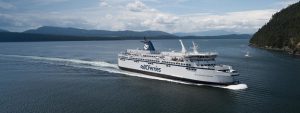
New fare choices, including advance purchase Saver fares, along with the removal of travel restrictions in the second quarter, are contributing to the recovery of vehicle traffic. @bcferries
VICTORIA – BC Ferries released its results for the three months ending December 31, 2021.
During the third quarter, two million vehicles and 4.1 million passengers accessed the ferry service, an increase of 26 per cent and 43 per cent, respectively, compared to the same period in the prior year. Year-to-date, the company carried 6.7 million vehicles and 14.2 million passengers, an increase of 26 per cent and 34 per cent, respectively, compared to the same period in the prior year.
These increases are significant. Vehicle and passenger traffic in the three months ended December 31, 2021 was lower by just two per cent and 14 per cent, respectively, compared to the same time frame in 2019, a pre-COVID-19 period.
“This quarter’s numbers are encouraging given the pandemic’s ongoing impacts on travel and the uncertainty it added through the holiday season,” said Mark Collins, BC Ferries’ President and CEO. “While COVID-19 continues to present staffing and operational challenges I want to take this moment to recognize the continued commitment of our employees in delivering safe and efficient service to our customers.”
New fare choices, including advance purchase Saver fares launched on the three Metro Vancouver – Vancouver Island routes late in March 2021, along with the removal of travel restrictions in the second quarter, are contributing to the recovery of vehicle traffic.
BC Ferries’ net loss for the third quarter ending December 31, 2021 was $1.6 million, compared to net earnings of $98.5 million in the same quarter the previous year primarily as a result of the timing of recognition of Safe Restart Funding.
Revenue for the third quarter ending December 31, 2021 was $222.2 million, a decrease of $89.7 million compared to the same period in the prior year. Without the recognition of Safe Restart Funding in both periods, revenues would have been $203.0 million, an increase of $45.9 million compared to the same period in the prior year.
Third quarter operating expenses were $209.5 million compared to $199.0 million the same period last year. This increase is due mainly to providing more round trips and higher fuel prices.
Year-to-date since April 1, 2021, net earnings were $83.0 million compared to $74.3 million in the same period in the prior year primarily as a result of higher traffic volumes and net retail sales, partially offset by lower Safe Restart Funding applied to the current year and higher operating expenses.
In December 2020, BC Ferries received $308 million through the Safe Restart Program, a federal-provincial initiative intended to help provinces and territories safely restart their economies. The goals of the Safe Restart Program are to mitigate the impact of revenue losses and COVID-19-related spending, to help restore the level of annual earnings required to maintain service levels, and to keep fare increases to affordable levels through March 31, 2024. Of the $308 million Safe Restart Funding, we have recognized a total of $268 million: $186 million in fiscal 2021 and $82 million in the nine months ended December 31, 2021.
Capital expenditures totalled $131.2 million for the first three quarters ($51.0 million in the third quarter). This included investments in new Island and Salish class vessels, life extension of the Queen of Alberni, major overhauls and inspections to existing ships, hardware upgrades, marine structure upgrades and various other projects.
The company continues to modernize the fleet with the addition of four more battery-electric hybrid Island Class vessels and one more liquefied natural gas-fuelled Salish Class vessel, all resulting in reduced emissions. The Island Class are battery equipped ships designed for full electric operation. The ships are fitted with hybrid technology that bridges the gap until funding and shore charging infrastructure becomes available. All of these new vessels are expected to enter service in 2022 and will help BC Ferries in its transition to a lower carbon future while investing in sustainable technologies.

